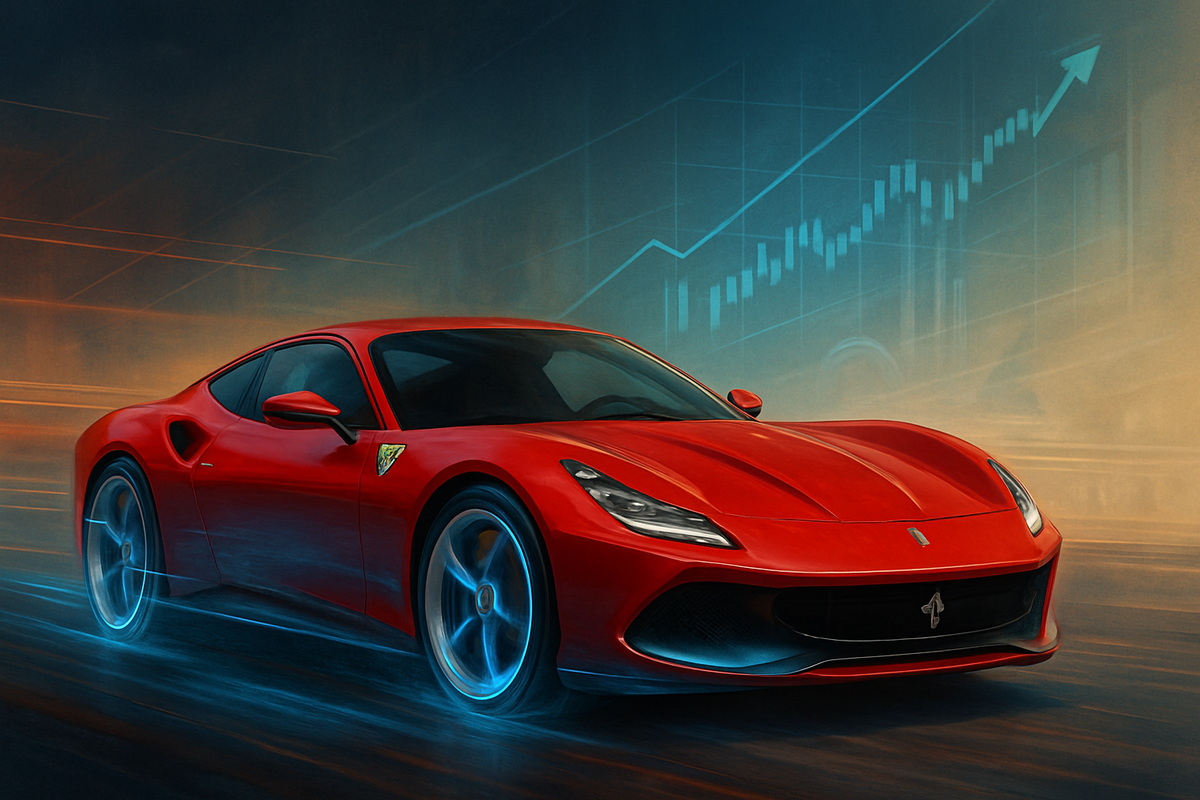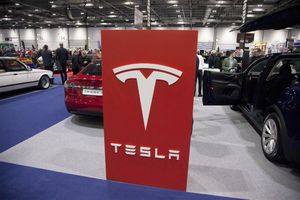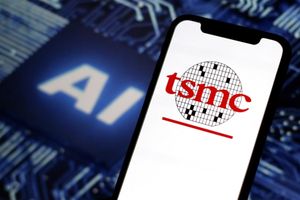
Maranello, Italy – October 17, 2025 – After a period of significant market turbulence, shares of luxury automaker Ferrari (NYSE: RACE) are showing signs of stabilization today, posting modest gains that suggest a potential rebound in investor confidence. This comes after the iconic Italian brand experienced a notable downturn earlier in the month, triggered by a significant revision to its long-term electric vehicle (EV) sales forecasts and revenue guidance. Today's slight uptick, while not indicative of a return to previous highs, offers a glimmer of hope that the market is beginning to digest and perhaps accept Ferrari's refined strategic direction.
The current market sentiment around Ferrari is a complex interplay of short-term disappointment and long-term brand strength. While the company's stock had plummeted by over 25% from its July highs, including a sharp 16% drop on October 9, today's performance indicates a possible floor being established. Investors are now closely scrutinizing how the legendary marque plans to balance its commitment to exclusivity and performance with the evolving demands of electrification, a challenge that appears more formidable for the luxury segment than initially anticipated.
The Electric Reality Check: Ferrari's Revised Vision and Market Reaction
The catalyst for Ferrari's recent market volatility was a pivotal announcement on October 9, 2025, when the company unveiled its first fully electric car. More significantly, however, was the accompanying revision of its strategic outlook. Ferrari's management dramatically lowered its forecast for the share of electric vehicles in total sales by 2030, cutting it from an ambitious 40% down to a more conservative 20%. This recalibration was attributed to lower-than-expected demand within the luxury EV segment and unforeseen technological hurdles, particularly concerning battery development and integration into high-performance vehicles.
Adding to investor concerns, Ferrari's management also provided updated 2030 revenue guidance, projecting approximately €9 billion, which fell short of the roughly €10 billion many analysts had previously anticipated. This dual blow—a slower EV transition and a lower long-term revenue outlook—sent shockwaves through the market, leading to the substantial stock price corrections observed throughout the first half of October. Furthermore, the company has also adjusted its sales strategy in key markets like the UK, reducing volumes to counter declining residual values, partly influenced by changes in UK tax laws affecting wealthy individuals.
Despite these headwinds, Ferrari's underlying brand strength and recent financial performance offer a counter-narrative that may be contributing to today's modest gains. The company reported strong financial results for 2024, achieving record sales and exceeding earnings expectations. It also provided a promising outlook for 2025, anticipating further growth driven by new model launches and expansion in non-car segments. These factors, combined with an upward revision of its 2025 guidance for key financial metrics and an announced increase in its dividend payout ratio from 35% to 40% of adjusted net profit, suggest a company still focused on delivering shareholder value amidst strategic adjustments.
Industry Ripples: Winners, Losers, and the Luxury EV Conundrum
Ferrari's (NYSE: RACE) revised EV strategy has significant implications for the company itself and the broader luxury automotive market. For Ferrari, the slower transition to full electrification allows it more time to perfect its EV technology, ensuring that its electric offerings maintain the brand's core tenets of performance, sound, and exclusivity. This measured approach could safeguard its brand identity, but it also risks falling behind competitors who push more aggressively into the EV space. The challenge will be to manage investor expectations while meticulously developing a truly "Ferrari" electric experience. The company's commitment to a new share repurchase program worth €3.5 billion from 2027 to 2031 signals a long-term confidence in its value proposition.
Competitors in the ultra-luxury segment, such as Porsche (XTRA: P911), Lamborghini (part of Volkswagen AG (XTRA: VOW3)), and McLaren, will be closely watching Ferrari's trajectory. If Ferrari's assessment of lower-than-expected luxury EV demand proves accurate, it could prompt other high-end manufacturers to re-evaluate their own aggressive electrification timelines. This might lead to a collective slowdown in the luxury EV race, allowing more time for battery technology to mature, charging infrastructure to expand, and consumer preferences to solidify. Conversely, if some competitors successfully crack the code of the luxury EV market, Ferrari's cautious approach could be perceived as a missed opportunity.
Suppliers to the automotive industry, particularly those specializing in EV components, might also feel the ripple effects. A slower ramp-up in luxury EV production from a key player like Ferrari could lead to adjustments in supply chain demand for advanced batteries, electric motors, and power electronics. Conversely, suppliers of high-performance internal combustion engine (ICE) components might see a prolonged demand for their products in the luxury segment, offering a temporary reprieve from the broader industry shift towards electrification.
Broader Significance: Luxury's Unique Path to Electrification
Ferrari's strategic pivot highlights a critical broader trend: the unique challenges and considerations for luxury brands navigating the transition to electric vehicles. Unlike mass-market automakers, luxury brands like Ferrari sell more than just transportation; they sell emotion, heritage, and an unparalleled driving experience. Replicating the visceral thrill of a V12 engine or the distinctive roar of a Ferrari powerplant in an electric format is a monumental engineering and branding challenge. The company's decision to temper its EV forecasts suggests that the current state of EV technology, particularly battery weight and charging times, may not yet fully align with the uncompromising demands of the ultra-luxury performance buyer.
This event fits into a wider industry debate about the pace and feasibility of an all-electric future, especially at the pinnacle of automotive engineering. While regulatory pressures worldwide continue to push for electrification, Ferrari's experience suggests that consumer demand in the high-end segment might not be moving at the same speed. This could lead to a divergence in strategies, with mass-market brands accelerating their EV adoption while luxury marques take a more gradual, technology-driven approach. Historically, luxury brands have always prioritized performance and exclusivity over volume, and this current challenge is a modern manifestation of that enduring philosophy.
Potential ripple effects could include other luxury manufacturers adopting a similar wait-and-see approach, investing more heavily in hybrid technologies as a bridge, or focusing on synthetic fuels to extend the life of ICE vehicles. The regulatory landscape may also need to adapt, recognizing the distinct market dynamics of the ultra-luxury sector, or risk alienating a significant segment of the automotive industry.
What Comes Next: A Path of Measured Innovation
In the short term, Ferrari (NYSE: RACE) investors should anticipate continued scrutiny of the company's updated EV strategy. The market will be looking for clearer communication on product timelines, technological advancements, and how Ferrari plans to maintain its allure while slowly integrating electric powertrains. Any further details on battery technology, charging solutions, or unique performance features for its upcoming EVs will be critical. The modest gains observed today could signal a period of stabilization, but significant upward momentum will likely depend on concrete execution of the revised plan.
Longer term, Ferrari's success hinges on its ability to innovate within the constraints of electrification without diluting its brand essence. This could involve strategic partnerships for battery development, groundbreaking chassis designs to compensate for battery weight, or even new sound engineering to create an emotional electric driving experience. The company's commitment to increased shareholder returns through dividends and share repurchases suggests management's belief in its long-term value, even with a slower EV ramp-up.
Potential strategic pivots could include a greater emphasis on bespoke customization, limited-edition hybrid models, or even exploring hydrogen fuel cell technology as an alternative to pure battery electric vehicles, if it proves more suitable for high-performance applications. Market opportunities may emerge for investors who believe in Ferrari's enduring brand power and see the recent stock dip as an attractive entry point, betting on the company's ability to navigate technological shifts with its characteristic blend of innovation and exclusivity.
A Legacy Redefined: Navigating the Future of Luxury Performance
In summary, Ferrari's (NYSE: RACE) journey through the electric transition serves as a compelling case study for the luxury automotive market. The recent recalibration of its EV sales forecasts and revenue guidance, while initially unsettling for investors, highlights the unique challenges faced by brands whose identity is deeply intertwined with traditional performance attributes. Today's modest stock gains suggest the market is beginning to process this revised reality, viewing it perhaps as a more pragmatic, albeit less aggressive, path forward.
Moving forward, the key takeaways are Ferrari's unwavering commitment to its brand identity, its strategic flexibility in adapting to market realities, and its continued focus on shareholder value. The company is not abandoning electrification, but rather approaching it with a cautious, perfectionist's eye, ensuring that every electric Ferrari lives up to the marque's legendary status.
Investors should closely watch Ferrari's upcoming earnings calls for updates on its product pipeline, R&D expenditures in electrification, and any further insights into consumer demand within the luxury EV segment. The global luxury market's health, particularly in key regions, will also remain a critical factor. Ultimately, Ferrari's ability to redefine its legacy in an electrified world, without compromising the soul of its brand, will determine its lasting impact and continued performance in the decades to come.
This content is intended for informational purposes only and is not financial advice





